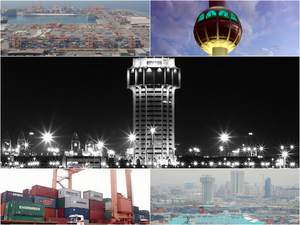
The Red Sea is a seawater inlet of the Indian Ocean, lying between Africa and Asia. Its connection to the ocean is in the south, through the Bab el Mandeb strait and the Gulf of Aden. To its north lie the Sinai Peninsula, the Gulf of Aqaba, and the Gulf of Suez. It is underlain by the Red Sea Rift, which is part of the Great Rift Valley.

Transport in Saudi Arabia is facilitated through a relatively young system of roads, railways and seaways. Most of the network started construction after the discovery of oil in the Eastern Province in 1952, with the notable exception of Highway 40, which was built to connect the capital Riyadh to the economically productive Eastern Province, and later to the Islamic holy city of Mecca and the port city of Jeddah. With the economic growth of the 1970s, the Kingdom of Saudi Arabia has initiated many infrastructure development projects across the country, and the extensive development of the transportation network has followed suit in support of various economic developments.

Port Sudan is a port city in eastern Sudan, and the capital of the state of Red Sea. As of 2007, it has 489,725 residents. Located on the Red Sea, Port Sudan is recognized as Sudan's main seaport and the source of 90% of the country's international trade.
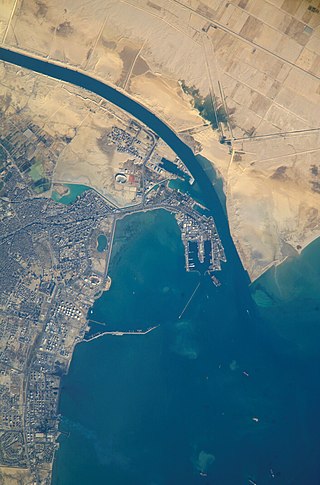
Suez is a seaport city in north-eastern Egypt, located on the north coast of the Gulf of Suez on the Red Sea, near the southern terminus of the Suez Canal, and is the capital of the Suez Governorate. It has three ports: the Suez Port, al-Adabiya, and al-Zaytiya, and extensive port facilities. Together they form a metropolitan area, located mostly in Africa with a small portion in Asia.

Jeddah, also spelled Jedda, Jiddah or Jidda, is a city in the Hejaz region of the Kingdom of Saudi Arabia (KSA) and the country's commercial center. It is not known when Jeddah was founded, but Jeddah's prominence grew in 647 when the Caliph Uthman made it a travel hub serving Muslim travelers going for Islamic pilgrimage to the holy city of Mecca. Since those times, Jeddah has served as the gateway for millions of pilgrims who have arrived in Saudi Arabia, traditionally by sea and recently by air. With a population of about 4,697,000 people as of 2021, Jeddah is the largest city in Makkah Province, the largest city in Hejaz, the second-largest city in the Saudi Arabia, and the ninth-largest in the Middle East. It also serves as the administrative centre of the OIC. Jeddah Islamic Port, on the Red Sea, is the thirty-sixth largest seaport in the world and the second-largest and second-busiest seaport in the Middle East.
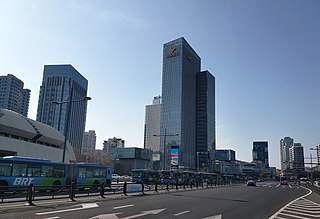
Lianyungang is a prefecture-level city in northeastern Jiangsu province, China. It borders Yancheng to its southeast, Huai'an and Suqian to its south, Xuzhou to its southwest, and the province of Shandong to its north. Its name derives from Lian Island, the largest island in Jiangsu which lies off its coastline, and Yuntai Mountain, the highest peak in Jiangsu, a few miles from the city center, and the fact that it is a port. The name can be literally translated as the Port Connecting the Clouds.

Duba is a small city on the northern Red Sea coast, of Saudi Arabia. It is in Tabuk Province. Local citizens describe it as The Pearl of the Red Sea. The population of Duba is about 22,000.

King Abdullah Economic City is a megaproject announced in 2005 by King Abdullah bin Abdulaziz Al Saud, the former king of Saudi Arabia.

The Saudi Railways Organization (SRO) was a state-owned railway company that operated part of Saudi Arabia's rail network, along with the Saudi Railway Company. The SRO operated a network of railways with a total length of approximately 1,380 kilometers. The network consisted of two main lines. A 449 km passenger line that links Dammam with Riyadh, and a 556 km freight line that connects the King Abdul Aziz Port in Dammam with Riyadh.

The Port of Ningbo-Zhoushan is the busiest port in the world in terms of cargo tonnage. It handled 888.96 million tons of cargo in 2015. The port is located in Ningbo and Zhoushan, on the coast of the East China Sea, in Zhejiang province on the southeast end of Hangzhou Bay, across which it faces the municipality of Shanghai.

The Port of Manila refers to the collective facilities and terminals that process maritime trade function in harbors in Metro Manila. Located in the Port Area and Tondo districts of Manila, Philippines facing the Manila Bay, it is the largest and the premier international shipping gateway to the country. The Philippine Ports Authority, a government-owned corporation, manages the Port of Manila and most of the public ports in the country. It is composed of 3 major facilities, namely Manila North Harbor, Manila South Harbor, and the Manila International Container Terminal.
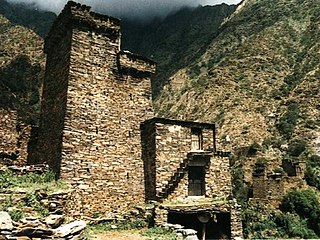
Saudi Arabia is the second biggest tourist destination in the Middle East with over 16 million visiting in 2017. Although most tourism in Saudi Arabia still largely involves religious pilgrimages, there is growth in the leisure tourism sector. As the tourism sector has been largely boosted lately, the sector is expected to be the white oil for Saudi Arabia. This is proved as tourism sector is expected to generate $25 billion in 2019. Potential tourist areas include the Hijaz and Sarawat Mountains, Red Sea diving and a number of ancient ruins.

The Saudi Landbridge is a railway line currently under development by the Saudi Railway Company (SAR).

Port of Jebel Ali, also known as Mina Jebel Ali, is a deep port located in Jebel Ali, Dubai, United Arab Emirates. Jebel Ali is the world's ninth busiest port, the largest man-made harbour, and the biggest and by far the busiest port in the Middle-East. Port Jebel Ali was constructed in the late 1970s to supplement the facilities at Port Rashid.
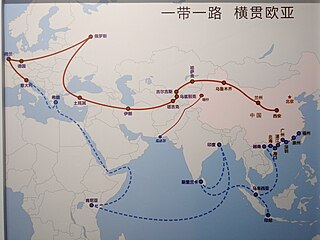
The 21st Century Maritime Silk Road, commonly just Maritime Silk Road (MSR), is the sea route part of the Belt and Road Initiative which is a Chinese strategic initiative to increase investment and foster collaboration across the historic Silk Road.

King Abdul Aziz Port, also known as Dammam Port, is a port in the city of Dammam, Saudi Arabia. It is the largest port in the Persian Gulf, and the third largest and third busiest port in the Middle East and North Africa (MENA) region, after the Jeddah Islamic Port. King Abdul Aziz Port is a major export center for the oil industry, and also a key distribution center for major landlocked cities in the country, particularly the capital cities of provinces, such as Riyadh which is linked to Dammam by a railway line.
Hamad Port is Qatar's main seaport, located south of Doha in the Umm Al-Houl area. Construction of the port began in 2010; it became operational in December 2016. It was officially opened in September 2017, and is expected to become fully operational by 2020. Capable of handling up to 7.8 million tonnes of products annually, the bulk of trade which passes through the port consists of food and building materials.

The siege of Jeddah was a naval battle that took place in the harbor of Jeddah between a Portuguese expeditionary force under Lopo Soares de Albergaria and Ottoman elements under Selman Reis. The Portuguese fleet arrived off the city’s coast on Easter day, 1517, Hijri year 923, and moored in the channel. After a quick naval action that day with few casualties, shore artillery prevented the Portuguese from landing, and weather ultimately caused them to withdraw.

The Attack on Jeddah occurred in 1541 and was the last attempt by the Portuguese to capture the city.
